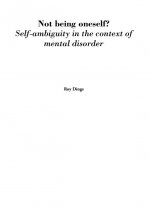
Not being oneself? Self-ambiguity in the context of mental disorder
Omschrijving
The current dissertation is part of an NWO-funded research project (no. 360-20-360) called Management of the Self: A humanities approach to self-management in psychiatry and psychosomatic illness.
Starting point of this project is the acknowledgement that there is an increasing call for self-management in both regular and mental health care practice, policy and research. Such self-management requires that patients are seen as ‘expert-clients’, who share responsibilities with clinicians and care-takers, and who are actively involved in the management of their own care. The supposed advantage of this novel approach is that it leads to a more cost-effective health-care and provides patients with a sense of efficacy. However, although it is relatively straightforward what self-management might entail in general health care (e.g. the patient herself measuring her blood values or changin RE: Proefschrift laten ontwerpen g her diet such as to facilitate particular parts of her treatment), it is not always clear what self-management for psychiatric patients entails.
This project argues that self-management in mental health care can only be truly realized when it is acknowledged that ‘the self’ itself is a core problem in psychiatric and psychosomatic conditions. Thus the project conceptualizes self-management as management of the self - as opposed to, or in addition to, management by the self (see e.g. Van Geelen 2014; Franssen & Van Geelen 2017; Van Geelen & Franssen 2017). To flesh out this novel conceptualization the project draws on theories of the self from various disciplines in the humanities (such as philosophy, phenomenology, ethics and narratology) and tries to establish a productive dialogue between these disciplines and psychiatry and psychosomatics.
